
Agago, Uganda | THE INDEPENDENT | Farmers in Agago have been given two months to stop farming in wetlands. The ultimatum was issued by the deputy RDC of Agago District, Susan Akot, after more than 20 farmers in Patongo Sub-County complained to her that their crops were being destroyed by roaming animals.
The farmers who are from the four parishes of Kal, Lukwangolu, Odongkiwinyo, and Lakwa, all in Patongo sub-county have been using wetlands in their areas to grow vegetables and sugarcane.
Akot instead directed the farmers to harvest all their crops within two months, because their activities on the wetlands were a violation of the presidential directive on farming in wetlands.
Cere Daniel, the LCIII Chairperson of Patongo sub-county said farming in a wetland is becoming more common due to the erratic rains and appealed to the RDCs to direct the local leaders to stop the practice.
Simon Odoch, an Agricultural Officer in Patongo Sub-County, said although there is a regulation that a wetland user leaves a 100-meter space between their garden and a wetland, no one respects that.
The National Environmental Management Authority-NEMA banned large-scale farming and other human-related activities in wetlands unless a user gets a permit, after proving that their activity is sustainable and harmless to the environment.
Odoch said wetland users don’t go to seek guidance on how to use the land, as well as leave tracks for animals and humans.
Odoch appealed to the officials in the office of the RDC to take lead in enforcing the law against environmental degradation, saying the elected leaders cannot do it for fear of losing votes in the future.
Albino Okidi a resident of Kal parish, is happy about the directive. Okidi thinks that farming in wetlands has made the four dams that provided water for their animals dry up. He complained that whenever their animals stray to the gardens, the farmers charge them a minimum of 400,000 Shillings as compensation for crops destroyed by the animals.
Environmentalists say wetlands are key for water storage and filtering nutrients and pollutants that would contaminate water sources.
******
URN
 The Independent Uganda: You get the Truth we Pay the Price
The Independent Uganda: You get the Truth we Pay the Price



